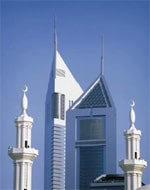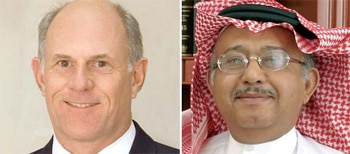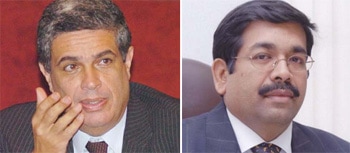RAPID CHANGE IS KEEPING BANK CEOS ON THEIR TOES AS THEY SEEK TO MEET THE SURGING DEMAND FOR FINANCIAL SERVICES IN A FAST-GROWING BUT VOLATILE REGION.

Meanwhile, big international banks such as Citigroup, Goldman Sachs and Morgan Stanley are expanding their presence in the region in the expectation that the price of oil will remain high for an extended period and that this under-banked area of the world will offer significant opportunities as governments boost spending, economies diversify, and legal and regulatory systems are reformed to promote private sector investment.
Douglas Dowie, chief executive of National Bank of Dubai, says the most difficult part of his job is keeping up with the pace of change. Dubais economy is growing at a 14% annual rate, which is faster than China, he says. The banks loan portfolio increased 68% in 2005, but Dowie says National Bank of Dubai is still a very conservative lender. We take particular care to see that our assets are of the highest quality, and this has been recognized by the ratings agencies, he says.
National Bank of Dubai is establishing an investment bank subsidiary in the Dubai International Financial Center. The newly incorporated unit will advise on mergers and acquisitions throughout the region, Dowie says. The bank has received initial approval from the central bank to establish an Islamic finance company subsidiary and expects to have it in place by the end of this year.
Banks in the Gulf region are serving economies that are growing faster than the banking sector, says Adel A. El-Labban, group CEO and managing director at Ahli United Bank, based in Bahrain. The growth in hydrocarbon prices will increase government spending, and new businesses will be created, he says. I see this continuing for the coming years.
Ahli United Bank is following a different business model than other financial institutions in the region, where it plans to create a branch network in all eight countries bordering the Gulf, according to El-Labban. We dont seek to be the leading bank in any market, but we want to be a significant player in all markets where we operate, he says. Our focus is on retail and private banking, both of which have sustainable economic and demographic fundamentals.
The petrodollars flooding into regional economies have a cascading effect, El-Labban says. The revenues enter at the government level and flow into the economy, creating a growing middle class, he says. The flows exceed the absorptive capacity of local economies, so we must find alternative investments, such as a French logistics fund or UK commercial property.
Ahli United Banks earnings rose 55% last year and increased 56% in the first quarter of 2006 from the same period a year earlier. The banks success is attributable to its focused vision and defined strategy, El-Labban claims. We create an expanding client base through acquisitions and convert these new banks to sustained earnings by developing their consumer and wealth-management capabilities, he says.
In December 2005 AUB acquired a 49% stake in Commercial Bank of Iraq. Besides the countries bordering the Gulf, AUB considers Egypt and Lebanon to be important secondary markets for the bank because of their synergy with the Gulf, according to El-Labban. As Global Finance went to press, AUB had a due-diligence team in Cairo considering a $700 million acquisition of Delta International Bank, which has 18 branches in Egypt. We also intend to acquire a bank in Switzerland at some point, to serve our private-banking clients, El-Labban says.
AUB introduced Islamic financing services, including home mortgages and consumer and corporate loans, in 1992 in the UK, when it was known as United Bank of Kuwait. AUB opened its first fully-fledged Islamic branch in Doha, Qatar, on June 15, 2006. Any transaction made at the branch will be Shariah compliant.
|
|
|
Avoiding the Risks
Ghazi Abdul-Jawad, president and CEO of Arab Banking Corporation, based in Bahrain, says his biggest concern is systemic risk. Even though our bank is very healthy, any misfortune befalling the region, or heightened political instability, will affect our business, he says. Our region is an unstable region. There have been three regional wars in the last 25 years. I have every reason to be worried, he says. You have to be adept and alert and fine tune your contingency planning. We are very well prepared. We are experts in crisis management, he adds.
ABCs earnings for the first quarter of 2006 increased 144% over the same period a year earlier. The first quarter was a very good one, Abdul-Jawad says. All areas of the bank have performed well. We have positioned ourselves in the money book for higher US dollar interest rates, and, therefore, we have benefited from the higher rates which flowed through our financial markets, he says. Our loan book did extremely well, and we had no deterioration in asset quality. We have not participated in lending to the boom in real estate or the stock market, he points out.
ABC is committed to buying a retail bank in the Gulf Cooperation Council (GCC) region, preferably in the United Arab Emirates if one is available and affordable. The bank is also seeking an operating license in Libya. The United States said in May that it was restoring normal diplomatic relations with Libya for the first time in more than 25 years, and Abdul-Jawad says that trading relations will follow. The competition from international banks in the region is coming in droves, and that will continue, he explains. It makes the landscape crowded and highly competitive. For that, we need to match the competition in terms of hiring the best talent available and offering the most competitive benefits to our staff, because the talent is a mobile asset, he says.
Meanwhile, Islamic financing in the region is developing rapidly. Many state borrowers are allowing for Islamic tranches, and state agencies are tapping the sukuk, or Islamic bond market. There is a big need for housing in the region, and commercial bank lending will not be able to satisfy the need, Abdul-Jawad says. Countries need to develop their mortgage industries and overhaul their legal systems.
Growth opportunities in Bahrains domestic market can be found in the fund-management business and in the insurance market. We are keeping our costs down by focusing on re-engineering our processes and looking at alternative delivery channels and outsourcing, Abdul-Jawad says.
Gulf International Bank, a Bahrain-based bank with a merchant banking strategy focused on the GCC states, earned a record $203 million in 2005. The banks lending increased by 33%. The greatest demand for loans is expected to continue to be in the corporate and project finance fields, says CEO Khaled M. Al-Fayez. This field is driven by the buoyant economic conditions prevailing in the region, where many projects are expected to be financed in the oil, gas, petrochemical, power and water industries throughout the GCC, he says.
GIB is the leading bank in the regions project finance market. Last year we increased the support we provide to international contractors and sponsors involved in projects in the region through the issuance of performance and project-related guarantees and working capital facilities, Al-Fayez says.
Revenue generated by GIBs investment banking business grew by 26% in 2005 and by 80% in the first quarter of 2006. In the past few months the bank advised on two major initial public offerings: the $119 million Saudi Paper Manufacturing IPO, which was oversubscribed by six times, and the ongoing $582 million IPO of Albaraka Banking, which was preceded by a private placement of $425 million in April.
Regional capital markets are in the midst of a historic transformation, Al-Fayez says. In the last few years the GCC stock markets have been witnessing unprecedented activity as high oil prices have allowed for abundant liquidity, remarkable corporate performance and positive business and consumer sentiment, he says. Regional market capitalization, particularly in Saudi Arabia, has enjoyed dramatic growth. Nevertheless, regional stock markets are still in the early stages of development and require long-term nurturing, Al-Fayez says. This is evident from the recent sharp stock market corrections.
Bond Markets Emerge

| |
|
Meanwhile, in Riyadh, Arab National Bank is expanding its branch network to GCC centers that will include Dubai, Abu Dhabi and Doha, according to CEO Robert Reid. The bank also plans to expand to Beirut as part of its regional strategy of serving Saudi Arabia-based clients in areas of trade, business, tourism and investments. While some recent project finance deals have been less than lucrative because of narrowing spreads, ANB will continue to consolidate its position as the leading project finance and trade bank in Saudi Arabia, according to Reid.
New Products Emerge

| |
|
The current penetration levels of financial products such as credit cards, consumer loans and housing finance in Saudi Arabia are well below those of other GCC countries, which are themselves quite low compared to developed markets. Therefore, we expect that the retail growth story will continue, Reid says. The corporate sector is also slated for a major expansion, he says. The relatively untapped markets for corporate advisory and mergers and acquisitions are expected to grow exponentially from a small base, he notes.
We expect heightened competition from new international entrants to Saudi markets, Reid says. Saudi Arabia has recently permitted foreign banks to open branches in the kingdom. The competition is likely to be focused on top-tier local corporate groups, investment banking and advisory services, wealth and asset management, corporate finance, and brokerage and research, according to Reid.
Attracting and keeping skilled employees is the biggest challenge for banks in the region. While female workers now comprise 3.5% of the banks payroll, the proportion of female employees could reach 20% in three years, Reid says.
John Coverdale, CEO of Saudi British Bank (SABB), says the introduction of new product and revenue streams contributed to the banks 52.2% rise in earnings last year, which was followed by a 116.3% increase in the first quarter of 2006. The bank has captured a 20% share of the market for investment funds, mutual funds and brokerage funds, he says. We are punching above our weight there, Coverdale says.
Saudi British Bank, which is 40%-owned by HSBC, is the market leader in Saudi Arabia for corporate finance and advisory services. In January 2005 SABB handled the first government privatization offering in two years, the National Company for Cooperative Insurance, or NCCI. In April 2006 it issued a E325 million floating-rate note with a five-year maturity, which was the first ever euro-denominated international bond issue by any Middle Eastern issuer.
SABB recently won approval from the Capital Markets Authority to establish a joint venture investment bank with HSBC, known as HSBC Saudi Arabia. The British bank holds a 60% stake, which along with its 40% interest in SABB gives it an effective 76% holding.
Timothy Gray, chief executive of HSBC Saudi Arabia, has been working on setting up the bank since even before July 2003, when the government passed the Capital Markets Law, which liberalized the market for investment banking, brokerage and related services. He already has 220 people on staff and says this total will reach 300 by the end of 2006.
As Global Finance went to press, the bank was about to launch a benchmark issue for Saudi Arabia Basic Industries, or Sabic, a petrochemicals and industrial conglomerate. The 1 billion Saudi riyal (about $270 million) issue is the first domestic bond issue ever and is Shariah compliant. Everybody is waiting for it to come out to see how we structured it, Gray says. HSBC Saudi Arabia is the financial adviser and lead manager of the issue.
The Islamic financing sector is very active, and new fund business tends to be Shariah compliant, following a structure that was developed in Malaysia and migrated to the GCC, Gray says. In the debt capital market and on the project financing side, there have been Islamic tranches in the past, he says. Last year, a whole projectthe $940 million Al-Waha petrochemical project at Jubailwas financed with Islamic project finance.
Of the top-10 banks in the GCC, seven are Saudi banks, says Brad Bourland, chief economist at Samba Financial Group, based in Riyadh. Banking was one of the sectors in Saudi Arabia that was progressively liberalized prior to the countrys actual accession to the World Trade Organization on December 11, 2005.
The liberalization of the banking sector began in 2002, Bourland says, following the issuance of new banking licenses to Emirates Bank, National Bank of Kuwait and National Bank of Bahrain. Deutsche Bank was the first non-GCC foreign bank to receive a license in late 2003, and BNP Paribas and JPMorgan Chase followed in 2004. Citigroup, which sold its 20% stake in Samba in 2004, is now exploring ways to return to the country.
The opening of the market will benefit both banks and consumers alike, Bourland says. It comes at a time when the economy is experiencing strong and sustained growth and deepening of capital markets, which will cushion the impact from the entrance of new players, he says.
Gordon Platt



